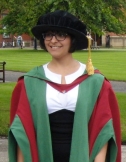Tatum Matharu
Having received a few puzzled looks in response to my recent move from Primary Care to the Business School, I feel the need to explain myself. Firstly, before Primary Care, I was based at the Institute of Local Government Studies for my PhD. But I researched the English regional assemblies (RAs). I say ‘but’ to reflect that I didn’t readily see myself as a student of local government. Or perhaps my normative position underlying my research, which looked at how social, environmental and economic partners in the RAs effectively ‘held their own’ as these bodies took shape, meant that I wanted to neutralise the perception that I, the ‘objective researcher’, or my research subject had necessarily sprouted from local government. I could, bar the brilliance of my supervisor, just have easily fitted into what was then a neighbouring department in the School of Public Policy: the Centre for Urban and Regional Studies. Both, in their then form and function, have since discontinued or have been otherwise re-organised. As have the RAs.
The rug was pulled from under the RAs during my fieldwork and the moving policy agenda seemed to be shaky ground upon which to build a foundation. Simultaneously, I opened the floodgates of postpositivism and was swimming around in a hermeneutic circle, in search of some anchorage. I was (and continue to be) thoroughly entertained by theoretical and methodological questions, but wanted a policy area with more vitality to take centre stage. Enter health. I spent the next 18 months developing and piloting indicators for a pay-related quality measurement tool used in the primary arm of the NHS. It was fascinating to be at the interface between clinically determined, rationally designed indicators and the people measured by the performance (GPs) and reception (patients) of these indicators; between, it felt, science and social science.
I learnt a great deal about the workings of the NHS as well as the complexity of health policy, but the role effectively required the eradication of complexity for the system to work. Within my new role, which is to review and synthesise theoretical literature and empirical evidence on procurement and supply chain management, I have scope to highlight the limitations of strictly rational understandings and applications of such processes in the domain of health. Using a methodology that specifically aims to draw out complexities from a range of perspectives, along with continual expert-practitioner collaboration, the research aims to support the newly charged clinicians-cum-commissioners in carving and constructing their role.
From this winding path I have travelled, this much I know:
On transferability: This is much more than a buzzword that should be shoe-horned into job applications. Transferable skills (e.g. time management, creative thinking, skilful communication) are equipment for the journey to find the niche that will provide decades of fruitful research. Often, the PhD is but a baby-step. Good transferable skills enable the simultaneous pursuit of the research matter at hand and space for future development. Further career options, such as one’s level or style of external collaboration (which is practically a pre-requisite in cutting-edge research), are founded on these skills.
On translation: Of critical importance to the art of collaboration is the act of communication. Each of the three projects detailed above (my PhD included) had built within it a direct link to the world of practice, and not simply as subjects and/or ‘consumers’ of the research but as, effectively, co-producers. Rather than simply reporting conclusions to the outside world, there is a need to involve other voices in our research, even as echoes from sounding boards. Translation is about clarifying and creating consensus around meanings, understanding the relative significance of research avenues and prioritising relevance with interested parties.
On transcending boundaries: As academics we’re naturally inclined to categorise, to create schemas and tables and to construct labels as we seek to understand the world around us and to share those understandings. As part of that process, we demarcate and, perhaps inadvertently, we create boundaries. The division drawn between academia and non-academia is one such boundary and, although the drive towards working across this is certainly taking hold (as demonstrated above), it is often pursued under the banner of ‘impact’, which is a notion predicated on the separation of academia and non-academia, or of science and society. The spirit of collaboration will surely win out over impact for impact’s sake, but we could do more to transcend boundaries within the academic environment, too. Too often there are separate puddles of research activity that could be pooled, which have led to calls for greater inter-disciplinarity, for reflecting the inter-connectedness of the ‘real world’ rather than departmental silos.
Beyond the indisputable knowledge creation born of cross-fertilisation in topics that straddle subjects, there is also intellectual gain in having some check-and-balance to the fundamentalism that can develop in isolation. Further along the same middle path, we could check the religion of (natural) science and build bridges with society through social science. Focussing greater attention here will require returning to the philosophical underpinnings of research whilst taking care not to return to the top of the ivory tower, all in the widest possible pursuit of learning and teaching.
Tatum Matharu completed her PhD at INLOGOV in 2012. She is a Research Fellow at Birmingham Business School, working on a project (described above) funded by the National Institute for Health Research, partnered with the University’s Health Services Management Centre. Her research interests include institutional design and development, critical methodologies and quality in health service development.
